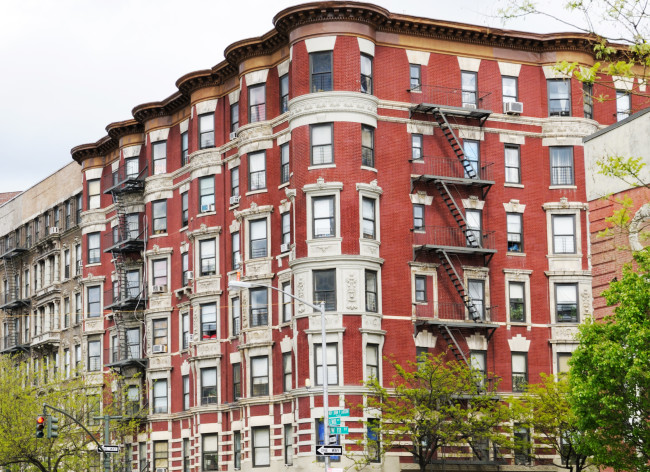NYC renters using housing vouchers report discrimination more often from larger landlords
- A report from housing nonprofit Unlock NYC examined bias complaints from voucher holders
- 34 percent of discrimination reports were filed against landlords who own 61 buildings or more

Roughly 37 of the reports Unlock NYC received were about apartments in Brooklyn, the most in the five boroughs.
iStock
Renting from a large management company usually comes with perks—like shared amenities, security cameras, and online rent payment options. But New Yorkers looking to pay their rent with a housing voucher complained of more discrimination from large landlords than small ones, according to a new report.
New Yorkers reported the most discrimination from landlords who own 61 buildings or more, according to an analysis of more than 2,000 complaints from Unlock NYC, a housing nonprofit with online tools for New Yorkers to report discrimination.
Unlock NYC’s 700 users—mostly families experiencing homelessness and single mothers—filed 34 percent of their reports against landlords who owned 61 buildings or more, 20 percent against landlords who own between 21 and 60 buildings, and another 20 percent against owners of 6 to 20 buildings, according to Unlock NYC’s analysis.
It’s illegal for a landlord or broker to refuse to rent to someone because they use a housing voucher, but this type of unlawful behavior—known as source of income discrimination—can be difficult to spot, said Manon Vergerio, Unlock NYC’s head of data and advocacy.
For example, large landlords did not often explicitly tell renters that they do not accept vouchers, according to the report. Instead, brokers and landlords of large properties more commonly ghosted renters—either by refusing to respond to a renter’s messages or by referring them to other staffers who fail to respond.
“The really small landlords still tend to say things like, ‘no, we don't take vouchers,’” Vergerio said. “That’s much less common with larger landlords. And our hypothesis is that these are big landlords with deep pockets. They probably have an in-house legal team that’s telling them what to do, what to say, and what not to say.”
Unlock NYC’s users complained that landlords—of any size—ghosted them in nearly half of the more than 2,000 reports. But that wasn’t the only tactic property owners used, according to the report.
[Editor’s note: This story is part of a series exploring housing voucher programs in NYC. You can also read our stories on bias against voucher holders, reporting discrimination, making sense of your voucher paperwork, renting an apartment with a voucher, how agents should treat voucher holders, and on getting help from the NYC Commission on Human Rights.]
What does source of income discrimination look like?
The most obvious form of discrimination is when a landlord or broker tells a renter that they don’t accept housing vouchers; that’s flat out illegal, and a violation of NYC’s Human Rights Law.
But you should also be on the lookout for other more subtle signs of discrimination, such as a landlord asking for a credit score. If your voucher covers all of your rent, it’s illegal for a landlord to take your credit score into account. And regardless of how much your voucher covers, a landlord cannot require you to make a certain annual income, according to the NYC Human Rights Commission.
It can be particularly difficult to gather evidence of discrimination when a landlord ghosts you—refuses to respond, or sends you on to an endless number of dead-end phone numbers or email inboxes, Vergerio said. Or, for example, a broker may say the unit is temporarily off the market, only to relist the apartment later, she added.
In these cases, a good strategy is to get a friend to pose as an interested renter to see if the apartment is still available, said Jessica Valencia, head of communications at Unlock NYC. (That’s something the NYC Commission on Human Rights does to investigate discrimination complaints.)
“It’s harder to prove this sort of discrimination,” Valencia said. “That’s why we often encourage our users to do a comparator test. For example, have a friend who is pretending to be a cash-paying tenant reach out to that broker via email, texting, or using our recorder … so that you can call and save that recording and that can also be attached to a report.”
Common tactics | Definition (per Unlock NY) | Percent of reports |
|---|---|---|
| Ghosting | Not responding after a prospective tenant mentions their voucher, or giving them the ‘run around.’ | 46 percent |
| No vouchers | Explicit denials, such as ‘the landlord doesn’t take vouchers’ or ‘no programs.’ | 17 percent |
| Unit availability | Anything that has to do with temporarily taking the unit off the market, pretending it has been rented already, or telling the voucher holder there is already an application on it. | 8 percent |
| Credit requirements | Turning a prospective tenant down because their credit score is insufficient. | 6 percent |
| Income requirements | Setting minimum income requirements, such as ‘you need to earn 40 times the rent.’ | 5 percent |
Brooklyn renters should beware; renters complained of the most discrimination in Brooklyn, according to the report. Roughly 37 of the reports Unlock NYC received were about apartments in the borough, followed by 23 percent in the Bronx, 20 percent in Queens, 17 percent in Manhattan, and 3 percent in Staten Island.
Valencia attributed the higher proportion of complaints in Brooklyn to gentrification.
“I do believe that gentrification has completely destabilized communities in Brooklyn. It's impacted so many families,” Valencia said. “I think as more corporate landlords started developing and building in Brooklyn they just did not want to have voucher holders—or low income folks in general—in their communities.”
What to do if you think you’ve been discriminated against
If you think a landlord or broker has discriminated against you, you can file a report with the NYC Commission on Human Rights through this online form, call 212-416-0197 to contact the commission directly, or call 311 and ask for “human rights.”
You can also use Unlock NYC’s online reporting tool, which allows you to record phone calls, collect evidence against a broker or landlord, and make a report to the commission. Make sure you’re gathering as much evidence of discrimination as possible: images of texts, emails, recorded phone calls, the apartment listing, etc, Valencia said.
“Finding housing is extremely difficult, so a lot of folks often feel disillusioned,” Valencia said. “But the more that you report the more pressure it’s putting on the city and the more pressure it's putting on the administration to allocate more funding to CCHR.”































